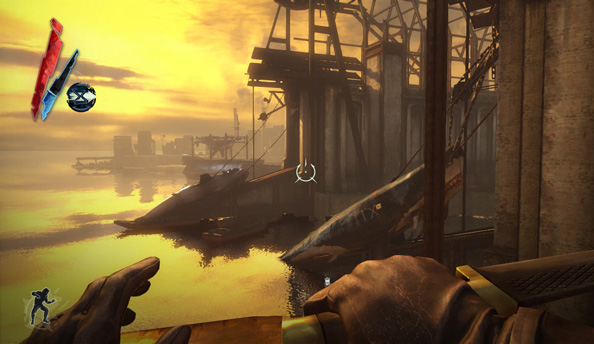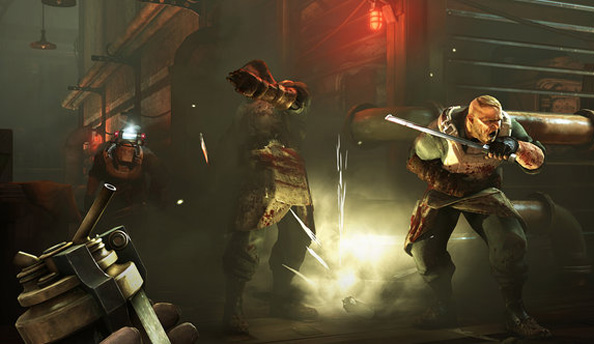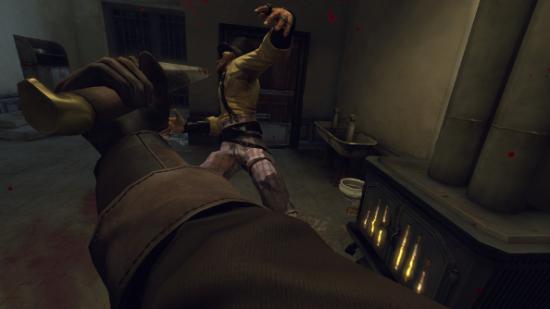This edition of The Weekly Playlist is a special issue, rather than bring you a smorgasboard of gaming stories, Rob and Jeremy argue the case for which of them is playing Dishonored “right”. Should Dunwall be delivered from its corrupt overlords by way of the knife or the sleeping dart? Is Rob’s violence playing into the hands of those being disposed of? Or, is Jeremy’s nonlethality simply an exercise in moral self-deception?
Rob: Jeremy, why is it that every time we start talking about Dishonored and comparing notes on our playthroughs, you get this look of consternation, then horror, and finally revulsion? It’s almost like you disapprove of the way I cut that guardsman’s throat and dumped him in Dunwall harbor, or the time I killed four Butchers with an oil tank explosion, or that gangster I froze in time, disemboweled, and fed to a group of ravenous rats. Yes, there it is! There’s that look again!
Jeremy: Rob, how many more before you’ll stop?
It’s not the killing that bothers me, exactly – I’m used to turning a blind eye when my friends cut strangers’ intestines free of their body just to watch Newtonian physics at its sloppiest. It’s that you preach what you practice. It’s not that you play Corvo as a street painter with a palette of only reds. It’s that you think it’s the right way to play Corvo. And that Dishonored, the one you play, is totally unrecognisable to me as the game I considered the best of last year.
So when I’m blinking from rooftop to lamppost to window ledge to bookcase, holding my breath and praying that the butcher five feet away will take a break from whale-slicing before his colleague ends his rounds exactly where I’m standing – I don’t feel like I’m doing it wrong. How can that possibly be wrong?

Rob: Let’s be clear, I’m no sanguinary Jackson Pollack, spackling Dishonored’s levels with blood and gore. I have crouched in the shadows for hours, memorizing patrol routes. I do my recon, and I do my fair share of nonlethal takedowns.
But where I really love Dishonored, where it exceeds a lot of other stealth games, is that moment when things go wrong and you have no choice but to “go loud”. If that butcher turns around and sees you, are you going to reload and try again, or are you going to draw your pistol and get this thing done? If you’re fast enough, maybe you can vanish before anyone else responds. Or maybe this turns into a massacre, complete with blinking, time-shifting, knockbacks, parries, and savage ripostes. No game has come as close as Dishonored to making me feel like Jason Bourne, suddenly coming back to himself as he realizes he just took out a room full of people and barely knows how he did it.
I’m all for stealth, but I think it’s criminal to deny yourself that. To deny Dishonored those fantastic segues from unbearable tension to deafening, violent release.
Jeremy: Like one of those acceptably creepy FBI agents in Criminal Minds or Hannibal, I have a certain amount of empathy with the killers. I do know what you mean. I played Fallout 3 for scores of hours as a stealth specialist, and recognised its failure to support “going loud” as its single, greatest failing. Oh sure, if you’d poured your points into plasma weapons, you could drown your enemies with noise – but a sneak like me? As soon as I was spotted, the game more-or-less broke down. I’d have one finger hovering above the quickload key, knowing I’d run out of entertaining options – it was fight and die or Benny Hill it outta there.
But Dishonored does offer a certain degree of non-lethal loudness. With a panicked sleep dart, a knack for catching unconscious bodies before they hit the ground and an upgraded, long-rage blink ability, I’ve learned to roll with my mistakes without recourse to recent saves. Thanks to choke dust and stun mines, The Knife of Dunwall offers even more scope for humane hightailing.
I’m acutely aware that I use only a fraction of the tools available to me – a knife has hung limply in my hand throughout my time with the game, dry as a bone – but I’m convinced that my choice has been rendered more meaningful as a result. In Thief, Garrett was a clumsy swordsman, far too vulnerable to entertain the idea of a full-on assault. In Deus Ex, rocket launchers were there – but the game’s very DNA was geared towards persuading you not to use them.
In Dishonored, things are different, for the reasons you’ve highlighted. The very fact that its combat experience is so complete, so enjoyable, turns pacifism into a moral code for the first time rather than a concession to mechanical sense.

Rob: Oh, I was so hoping you’d bring morality into this. Because here’s truth about Dishonored: it mocks the moral vanity of the pacifist playthrough. If there is an overriding theme to the game it is about the ultimate folly of trying to keep your hands clean while accomplishing a fundamentally violent end.
I mean, hell, let’s consider how many of the “nonlethal” options function just like magic. Oh, don’t worry, you didn’t really hurt this person, you just choked him until he passed out, but he’ll be fine. You just shot that guy in the head with a sleep dart, he’s just resting now. Thief’s Garrett specialized in massive-but-harmless cranial trauma. One thing I always admired about the Hitman series was that people you knocked out would eventually wake up to raise the alarm. That was a game that really made you choose between the smart, effective option (the silent kill) and the far more difficult, less bloody paths through each mission.
So even from the first, something has always felt a bit off about the “nonlethal” playthrough. So many of the takedowns are just kills without the stigma.
But really, what is your moral code when you play as a pacifist? You didn’t kill anyone? Some people need killing. I went into The Knife of Dunwall wanting a clean, bloodless playthrough. My first mission I made it inside the refinery, and the first thing I see is a butcher bullying one of the former strikers (who has JUST been tortured by management) and then carving his chest cavity open for a laugh.
I think the moral choice there is to intervene. The notion that somehow sparing bloodshed is the virtuous path is, to me, nothing more than an abdication of responsibility. Dishonored lets you get a really striking amount of insight into who these people are who surround you, and what their culpability is for Dunwall’s squalor and brutality. A lot of these people are pure malignance, and to know that, to watch them brutalize innocents and say, “Well, I’m a pacifist” is selfish in the extreme.
Jeremy:So I’m happy to let a guard’s head bash against the cobbles and take the credit for his continued existence. That’s silly. I’ll tuck an unconscious felon away in an alley without a thought for the horrifying fate that surely awaits him on the end of little rat knife-teeth. Absurd, I know. But here’s the thing: I can accept that Arkane’s take on pacifism isn’t one-to-one with my own. In Dishonored, ‘goodness’ is defined through the prism of the FPS genre, which makes mass murderers of us all. There, the decision to merely concuss a bad guy rather than dice him up is the act of a veritable lamb, a hopeless sissy. It’s Hollywood morality, is what it is – where any sign of remorse in a serial killer is good enough to make him the hero.
But you know what, Robschach? Your approach to morality isn’t exactly one-to-one either. You hover above the city, making binary judgements of its denizens. Then, just occasionally, you’ll swoop down to squeeze the life out of a man because the beating human organ you keep in your back pocket tells you he’ll “kill again”. What’s that? Murder as preventative measure? Oh ho. That might pass for a moral choice in Dunwall, but it’s not going to wash with your old mum back in the real world. Old mums simply won’t stand for that sort of thing.
And I’m not a religious man, but I don’t believe there’s any worth in a self-imposed commandment like Thou Shalt Not Kill if it’s never tested. Was I sure, as I handed a young noblewoman over to a masked creep who intended to keep the object of his infatuation in some personal dungeon somewhere, that I was doing the right thing? Absolutely not. Less so now. But I stuck to my code. Is there any value in code, in itself? I don’t know. But bringing an absolute into a world in almost total flux makes for an emotional wringer of a game, I can tell you.
You know what the worst thing about all this is? You never get to hear them snore. Oh, Rob – there’s nothing more human than the gentle alarm sounded by a man’s nose as you lay him down in some dumpster. If you’d heard that, you wouldn’t kill them. Not then.
